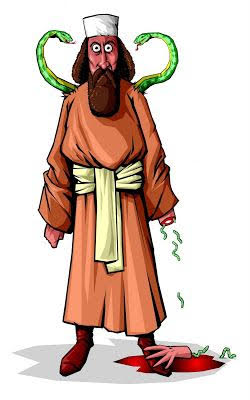 |
(1)
오래전, 페르시아에 어깨수술 받은 괴물이 있었다. 이쪽 얘기가 대체로 좀 장황하고 긴데, 이 얘기도 그렇다. 힘껏 줄여보자.
어느날 왕자는 한 사내의 방문을 받았다. 사내가 유혹했다. “아빠 죽이면 왕자님도 왕이 될 수 있슈!” 왕자는 귀가 얇았다. 유혹에 넘어가 아빠를 죽이고 왕좌에 올랐다. 폭정이 시작됐다.
어느날 왕자 출신 왕은 한 셰프의 방문을 받았다. 셰프는 왕에게 세상의 온갖 음식을 만들어 바쳤다. “끄윽, 잘 먹었다. 소원을 말해봐.” “좀 민망한 부탁인디.... 임금님 양 어깨에 뽀뽀나 한번.....” 왕은 부끄러워 하며 어깨를 노출했다. 셰프는 두 어깨에 뽀뽀를 하더니 홀연 사라졌다.
어어, 셰프가 사라지자 어깨에 극심한 통증이 찾아왔다. “아이구, 이게 뭐랴....” 두 어깨에는 검은 뱀이 한 마리씩 돋아나고 있었다. “아이구, 어깻죽지 찢어지겄네....”
왕은 저명한 돌팔이들에게 어깨수술을 의뢰했다. 다 실패했다. 뱀은 자르고 잘라도 또 돋아났다. 왕은 부탁 잘 들어주기로 유명한 서울의대 교수에게 어깨좀 봐달라고 또 부탁했다. 서울의대 교수는 나경원이 뭘 부탁한 게 있어 바쁘다며 거절했다.
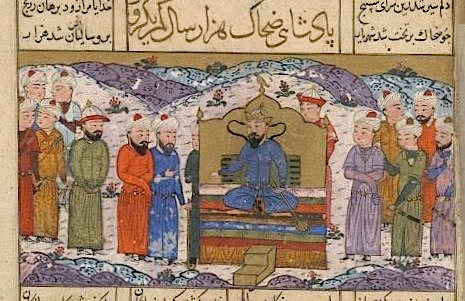 |
그러던 어느날 듣보잡 명의가 나타났다. 명의가 말했다. “두 마리 뱀은 그냥 살려두시고, 젊은사람의 뇌를 먹이로 주슈. 그러면 어깨통증이 사라질 뀨. 그렇게 하문 뱀들도 결국 자멸할 것이유.”
왕은 매일 사람 둘을 잡아 그들의 뇌를 두 마리 뱀에게 바쳤다. 뇌를 구하기 위해 이란과 전쟁도 일으켰다. 뱀괴물이 된 왕의 폭정이 날로 심해졌다. 길고 긴 시간이 흘러갔다. 무려 천 년.
이란에서 봉기가 일어났다. 성공했다. 뱀괴물 폭군은 사슬에 꽁꽁 묶여 산에 봉인됐다. 절대 빠져나올 수 없는 산감옥이었다. 대장장이 출신의 봉기 지도자는 새로운 이란의 왕으로 추대됐다.
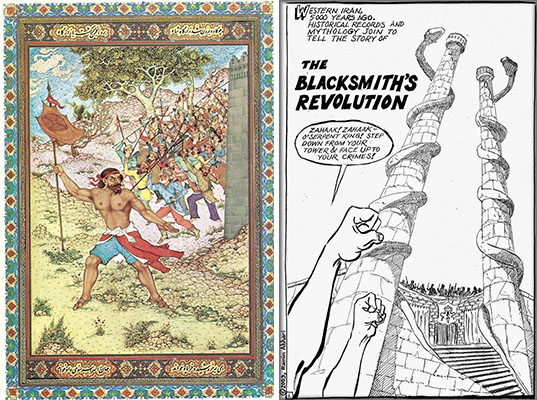 |
(왕의 아들로 태어났으나 뱀괴물이 된 건 자업자득이다. 악령의 꾀임에 넘어간 게 누구 죄란 말인가. 또한 이제사 밝히지만, 사실 왕자를 찾아간 놈들은 한 악령이었다. 사내도 셰프도 의사도 그 악령의 변신일 뿐이었다.)
(2)
옛날옛적, 한국에 어깨수술 받은 닭괴물이 있었다. 사람으로 태어났으나 괴물이 된 존재였다.
이야기의 앞부분은 이렇다. “어느날, 공주는 한 사내의 방문을 받았다. 사내가 유혹했다. “아빠 죽으면 공주님도 대통령이 될 수 있쥬!” 귀 얇은 공주는 아빠가 죽자, 시간은 좀 오래 걸렸지만, 과연 대통령이 됐다.....” 다 아는 얘기니까 이만 줄인다.
박근혜가 탈옥했다. 하여간 어깨수술 잘 되기를 바란다.
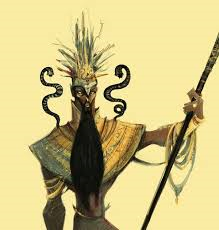 |
(부록)
등장 인물
아들 ; 왕자 출신 왕. 자하크.어깨수술 받음. 결국 스스로 괴물이 됨. 별명 ‘페르시아의 천년 마왕’. 악마 아지 다하카(Aži Dahãka, 페르시아 지역에서 사탄의 기원으로 대접받는 놈)와 동일시 되는 경우 있음. Zahhak is an evil king who conquers Iran and who has serpents growing out of his shoulders. This story come from Shahnameh book.
아빠 ; 메르다스 왕. Merdās.
악귀 : 셰프 등으로 변신하여 왕자를 망침. Ahriman.
민중봉기 지도자 : Kāva (Kaveh). 대장장이 출신.
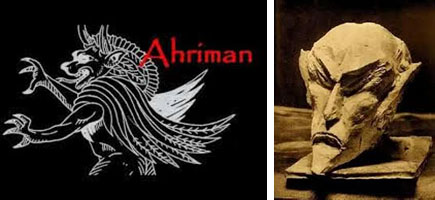 |
뱀괴물, 전쟁을 일으키다
뱀괴물은 뇌를 구하기 위해 이란 침공. 이란 왕의 두 딸도 포로로 잡음. 이란 젊은이 두명이 매일 죽어 뇌를 빼앗겼다.
민중봉기와 지도자
지도자는 대장장이 카베. 표식이었던 개가죽 앞치마는 페르시아 왕조의 깃발이 된다네.
갖힌 산
다마반드산.
 |
긴 이야기
When Zahhāk was a young man, Ahriman first appeared to him as a glib, flattering companion, and by degrees convinced him that he ought to kill his own father and take over his territories. He taught him to dig a deep pit covered over with leaves in a place where Merdās was accustomed to walk; Merdās fell in and was killed. Zahhāk thus became both parricide and king at the same time.
Ahriman now took another guise, and presented himself to Zahhāk as a marvellous cook. After he had presented Zahhāk with many days of sumptuous feasts (introducing meat to the formerly vegetarian human cuisine), Zahhāk was willing to give Ahriman whatever he wanted. Ahriman merely asked to kiss Zahhāk on his two shoulders. Zahhāk permitted this; but when Ahriman had touched his lips to Zahhāk's shoulders, he immediately vanished. At once, two black snakes grew out of Zahhāk's shoulders. They could not be surgically removed, for as soon as one snake-head had been cut off, another took its place.
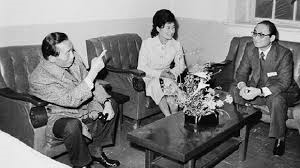 |
| “돌아가시문 지가 책임지구 영애님을 대통령 만드께유....” |
Ahriman now appeared to Zahhāk in the form of a skilled physician. He counselled Zahhāk that the only remedy was to let the snakes remain on his shoulders, and sate their hunger by supplying them with human brains for food every day otherwise the snakes will feed on his own.
Zahhāk's two snake heads still craved human brains for food, so every day Zahhāk's spies would seize two men, and execute them so their brains could feed the snakes. Two men, called Armayel and Garmayel, wanted to find a way to rescue people from being killed from the snakes. So they learned cookery and after mastering how to cook great meals, they went to Zahhāk's palace and managed to become the chefs of the palace. Every day, they saved one of the two men and put the brain of a sheep instead of his into the food, but they could not save the lives of both men. Those who were saved were told to flee to the mountains and to faraway plains.
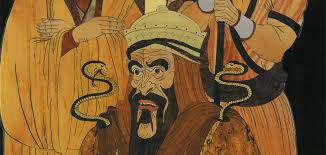 |
Zahhāk's tyranny over the world lasted for centuries. But one day Zahhāk had a terrible dream – he thought that three warriors were attacking him, and that the youngest knocked him down with his mace, tied him up, and dragged him off toward a tall mountain. When Zahhāk woke he was in a panic. Following the counsel of Arnavāz, he summoned wise men and dream-readers to explain his dream. They were reluctant to say anything, but one finally said that it was a vision of the end of Zahhāk's reign, that rebels would arise and dispossess Zahhāk of his throne. He even named the man who would take Zahhāk's place: Fereydun.
Zahhāk now became obsessed with finding this "Fereydun" and destroying him, though he did not know where he lived or who his family was. His spies went everywhere looking for Fereydun, and finally heard that he was but a boy, being nourished on the milk of the marvelous cow Barmāyeh. The spies traced Barmāyeh to the highland meadows where it grazed, but Fereydun had already fled before them. They killed the cow, but had to return to Zahhāk with their mission unfulfilled.
Zahhāk now tried to consolidate his rule by coercing an assembly of the leading men of the kingdom into signing a document testifying to Zahhāk's righteousness, so that no one could have any excuse for rebellion. One man spoke out against this charade, a blacksmith named Kāva (Kaveh). Before the whole assembly, Kāva told how Zahhāk's minions had murdered seventeen of his eighteen sons so that Zahhāk might feed his snakes' lust for human brains – the last son had been imprisoned, but still lived.
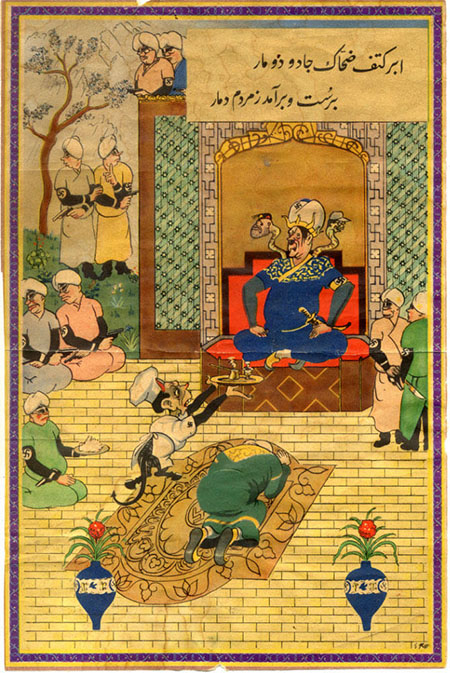 |
| 2차 세계대전 당시 신화에 빗댄 반 나치-반 히틀러 선전물. |
In front of the assembly Zahhāk had to pretend to be merciful, and so released Kāva's son. But when he tried to get Kāva to sign the document attesting to Zahhāk's justice, Kāva tore up the document, left the court, and raised his blacksmith's apron as a standard of rebellion – the Kāviyāni Banner, derafsh-e Kāviyānī (درفش کاویانی). He proclaimed himself in support of Fereydun as ruler.
Soon many people followed Kāva to the Alborz mountains, where Fereydun was now living. He was now a young man and agreed to lead the people against Zahhāk. He had a mace made for him with a head like that of an ox, and with his brothers and followers, went forth to fight against Zahhāk. Zahhāk had already left his capital, and it fell to Fereydun with small resistance. Fereydun freed all of Zahhāk's prisoners, including Arnavāz and Shahrnāz.
 |
Kondrow, Zahhāk's treasurer, pretended to submit to Fereydun, but when he had a chance he escaped to Zahhāk and told him what had happened. Zahhāk at first dismissed the matter, but when he heard that Fereydun had seated Jamshid's daughters on thrones beside him like his queens, he was incensed and immediately hastened back to his city to attack Fereydun.
When he got there, Zahhāk found his capital held strongly against him, and his army was in peril from the defense of the city. Seeing that he could not reduce the city, he snuck into his own palace as a spy, and attempted to assassinate Arnavāz and Shahrnāz. Fereydun struck Zahhāk down with his ox-headed mace, but did not kill him; on the advice of an angel, he bound Zahhāk and imprisoned him in a cave underneath Mount Damāvand, binding him with a lion's pelt tied to great nails fixed into the walls of the cavern, where he will remain until the end of the world. Thus, after a thousand years' tyranny, ended the reign of Zahhāk.
 |
이란의 봉기
Kaveh the Blacksmith (Persian: کاوه آهنگر – Kāve ye Āhangar), also known as Kawa or the Blacksmith of Isfahan, is a mythical figure in the Iranian mythology who leads a popular uprising against a ruthless foreign ruler, Zahāk (Aži Dahāk). His story is narrated in the Shahnameh, the national epic of Iran, by the 10th-century Persian poet Ferdowsi.
Kāveh was, according to ancient legends, a blacksmith who launched a national uprising against the evil foreign tyrant Zahāk, after losing two of his children to serpents of Zahāk. Kāveh expelled the foreigners and re-established the rule of Iranians. Many followed Kāveh to the Alborz Mountains in Damāvand, where Fereydun, son of Ābtin and Faranak was living. Then a young man, Fereydun agreed to lead the people against Zahāk. Zahāk had already left his capital, which fell to Fereydun's troops with small resistance. Fereydun released all of Zahāk’s prisoners.
Kāveh is the most famous of Persian mythological characters in resistance against despotic foreign rule in Iran. As a symbol of resistance and unity, he raised his leather apron on a spear. This flag, known as Derafsh Kaviani, was later decorated with precious jewels and became the symbol of Persian sovereignty for hundreds of years, until captured and destroyed by the Arabs, following the defeat of the Sassanids at the Battle of al-Qādisiyyah. Ya'qub ibn al-Layth al-Saffar, who rebelled against the Abbasid Caliphate, claimed the inheritance of the kings of Persia and sought "to revive their glory," in 867 he sent a poem written by himself to the Abbasid caliph Al-Mu'tazz, stating: "With me is the Derafsh Kaviani, through which I hope to rule the nations." In later times, Kaveh the Blacksmith was invoked by Persian nationalists starting from the generation of Mirza Fatali Akhundov. His name was used as the title of a nationalist newspaper in 1916, and in 1920, adorned the canton of the flag of the Persian Socialist Soviet Republic (widely known as the Soviet Republic of Gilan).
Mehregan is the celebration for Fereydun's victory over Zahāk; it is also the time when autumn rains begin to fall.
The dynasty of Karen Pahlav (also known as the House of Karen) claimed to be Kāveh's descendants.
관리자 freemediaf@gmail.com
<저작권자 © 자유언론실천재단, 무단 전재 및 재배포 금지>

